Sprouts Farmers Market Bundle
How Does Sprouts Farmers Market Thrive in the Grocery Game?
Sprouts Farmers Market, a leader in the natural and organic food retail space, is rapidly expanding, with plans to open dozens of new stores in the coming years. But what exactly makes this Sprouts Farmers Market SWOT Analysis so successful? From its unique store layout to its focus on fresh, healthy, and affordable options, Sprouts is redefining the grocery store experience. This exploration dives deep into the Sprouts company's operational strategies and financial performance.
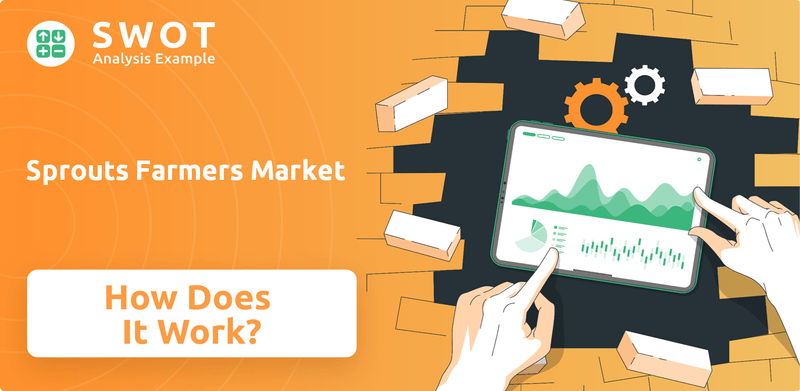
Understanding how Sprouts Farmers Market sources its products, manages its supply chain, and engages with its customers is key to appreciating its market position. Whether you're a potential investor evaluating its growth potential, a health-conscious consumer curious about the Sprouts store experience, or an industry analyst tracking trends in the healthy food market, this analysis provides essential insights. Discover the secrets behind Sprouts' success and learn what sets it apart from competitors like Whole Foods.
What Are the Key Operations Driving Sprouts Farmers Market’s Success?
The Sprouts Farmers Market creates value by offering a unique shopping experience focused on fresh, natural, and organic foods. The Sprouts store focuses on providing a wide array of fresh produce, a significant portion of which is organic, along with natural meats, seafood, bulk foods, dairy, baked goods, and a comprehensive selection of vitamins, supplements, and natural health products. This approach caters to health-conscious consumers who prioritize fresh, wholesome ingredients and seek value in their grocery shopping.
Operational processes at the Sprouts company are centered around efficient sourcing and distribution to maintain product freshness and competitive pricing. The company emphasizes direct relationships with growers for its produce, ensuring quality and often reducing costs. The supply chain is designed to move products quickly from farm to store, minimizing spoilage and maximizing freshness. In-store operations are characterized by an open, farmers market-style layout that encourages discovery and provides a pleasant shopping environment.
Sales channels are predominantly physical retail stores, though the company has expanded its e-commerce capabilities, including partnerships for delivery services, to enhance customer convenience. The unique value proposition lies in its ability to offer high-quality natural and organic products at prices that are often more competitive than traditional supermarkets or specialty organic stores, achieved through efficient sourcing, a focused product assortment, and a less elaborate store infrastructure. For more insights into their strategic growth, check out the Growth Strategy of Sprouts Farmers Market.
Sprouts Farmers Market focuses on direct relationships with growers. This approach ensures high-quality produce and helps control costs. The supply chain is designed for speed, moving products from farms to stores efficiently to maintain freshness.
The store layout is designed to mimic a farmers market. This open layout encourages customers to explore and discover products. The atmosphere is intended to be inviting and conducive to a pleasant shopping experience.
The Sprouts store offers a broad selection of fresh produce, with a significant emphasis on organic options. They also provide natural meats, seafood, bulk foods, dairy, baked goods, and health products. This diverse range caters to various dietary needs and preferences.
Sprouts Farmers Market aims to offer high-quality natural and organic products at competitive prices. This is achieved through efficient sourcing, a focused product range, and a streamlined store infrastructure. This value proposition attracts health-conscious consumers.
Sprouts Farmers Market focuses on several key operational aspects to maintain its competitive edge. These include direct sourcing from growers, an efficient supply chain, and a distinctive in-store experience. The company also emphasizes a wide variety of products.
- Sourcing: Direct relationships with growers for quality and cost control.
- Supply Chain: Designed for speed to ensure product freshness.
- Store Layout: Open, farmers market-style to encourage exploration.
- Product Range: Emphasis on fresh, natural, and organic foods.
Sprouts Farmers Market SWOT Analysis
- Complete SWOT Breakdown
- Fully Customizable
- Editable in Excel & Word
- Professional Formatting
- Investor-Ready Format
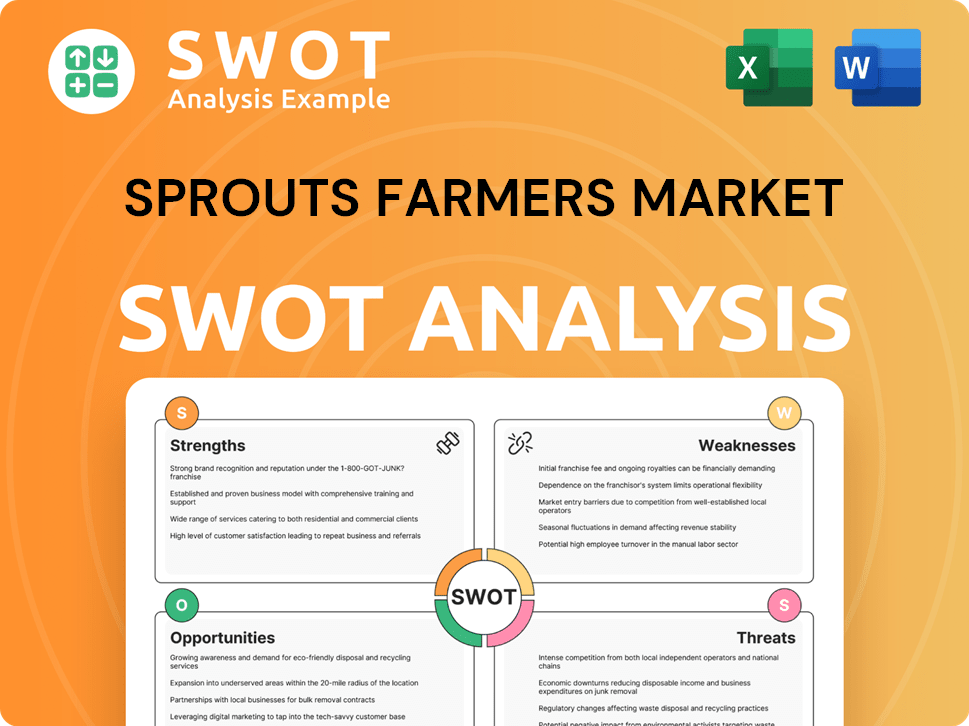
How Does Sprouts Farmers Market Make Money?
The primary revenue stream for Sprouts Farmers Market comes from direct sales of natural and organic food items. This includes a wide array of products sold both in physical stores and through online platforms. The Sprouts company focuses on providing a diverse selection of items to meet consumer demand.
The Sprouts store generates revenue through various product categories, with fresh produce being a significant contributor. Other key areas include packaged groceries, deli items, meat and seafood, vitamins, supplements, and bulk foods. The company's approach emphasizes high-volume sales of competitively priced natural and organic products.
Monetization strategies at Sprouts Farmers Market revolve around driving foot traffic and encouraging repeat purchases. This is achieved through appealing product assortments, value propositions, and promotional activities. The company also leverages private label brands to boost margins and foster customer loyalty.
Sprouts employs several strategies to maximize revenue and customer engagement. These include competitive pricing and a focus on high-quality, natural, and organic products. The company also uses various promotional tools to increase sales.
- Product Sales: The core of Sprouts' revenue comes from selling a wide variety of products.
- Promotions and Circulars: Weekly circulars and in-store promotions drive traffic and sales.
- Private Label Brands: These contribute to higher profit margins and customer loyalty.
- Third-Party Delivery: Partnerships with delivery services expand the reach of online sales.
Sprouts Farmers Market PESTLE Analysis
- Covers All 6 PESTLE Categories
- No Research Needed – Save Hours of Work
- Built by Experts, Trusted by Consultants
- Instant Download, Ready to Use
- 100% Editable, Fully Customizable
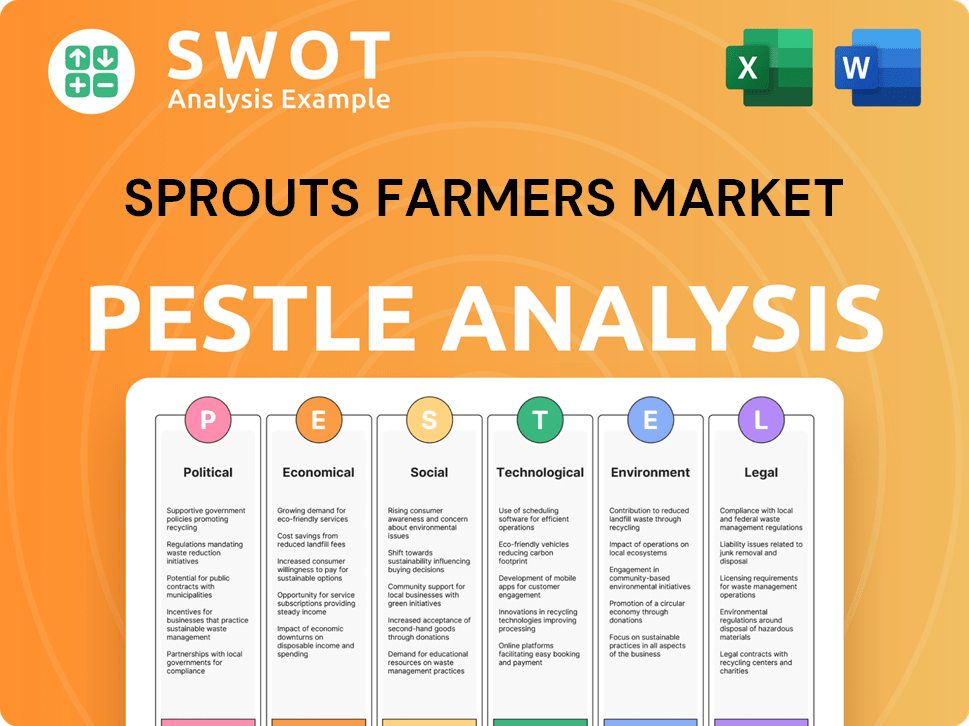
Which Strategic Decisions Have Shaped Sprouts Farmers Market’s Business Model?
The journey of Sprouts Farmers Market has been marked by significant milestones. These include strategic decisions that have shaped its operational and financial trajectory. The company's expansion strategy, particularly its focus on store growth, has been a key driver of its increasing market presence. This growth is supported by its ability to adapt to market changes and maintain a strong brand identity within the natural and organic food sector.
A key strategic move for the
Sprouts' competitive advantages include its strong brand recognition within the natural and organic food sector, its differentiated store format that evokes a farmers market feel, and its perceived value proposition of offering healthy products at affordable prices. The company's emphasis on fresh produce and a curated assortment of natural and organic products sets it apart from conventional grocers. Sprouts continues to adapt to new trends, such as the growing demand for convenient online shopping, by expanding its e-commerce capabilities and partnering with delivery services.
Sprouts has achieved several key milestones, including significant store growth and successful navigation of operational challenges. The company's strategic decisions have shaped its operational and financial performance. This has involved adapting to market changes and maintaining a strong brand identity within the natural and organic food sector.
The company's strategic moves include consistent store expansion, with plans for approximately 30 new stores in 2024 and 2025. The company has also focused on smaller, more efficient store formats. Furthermore, Sprouts has strengthened its sourcing networks to mitigate supply chain disruptions.
Sprouts' competitive advantages include strong brand recognition, a unique store format, and a value proposition of offering healthy products at affordable prices. The company's emphasis on fresh produce and a curated assortment of natural and organic products sets it apart. Adaptability to new trends, such as online shopping, also contributes to its competitive edge.
Sprouts is adapting to the growing demand for convenient online shopping by expanding its e-commerce capabilities and partnering with delivery services. This adaptability, combined with its focused product offering and efficient operational model, sustains its business model in a highly competitive industry. The company’s ability to innovate and meet evolving customer needs is crucial.
Sprouts' competitive advantages are multifaceted, including strong brand recognition, a unique store format, and a value proposition centered on offering healthy products at affordable prices. These factors contribute to its sustained success in the competitive grocery store market. The company's focus on fresh and organic products further differentiates it from conventional grocers.
- Strong Brand Recognition: Recognized within the natural and organic food sector.
- Differentiated Store Format: Evokes a farmers market feel.
- Value Proposition: Offers healthy products at affordable prices.
- Product Focus: Emphasis on fresh produce and a curated assortment of natural and organic products.
Sprouts Farmers Market Business Model Canvas
- Complete 9-Block Business Model Canvas
- Effortlessly Communicate Your Business Strategy
- Investor-Ready BMC Format
- 100% Editable and Customizable
- Clear and Structured Layout
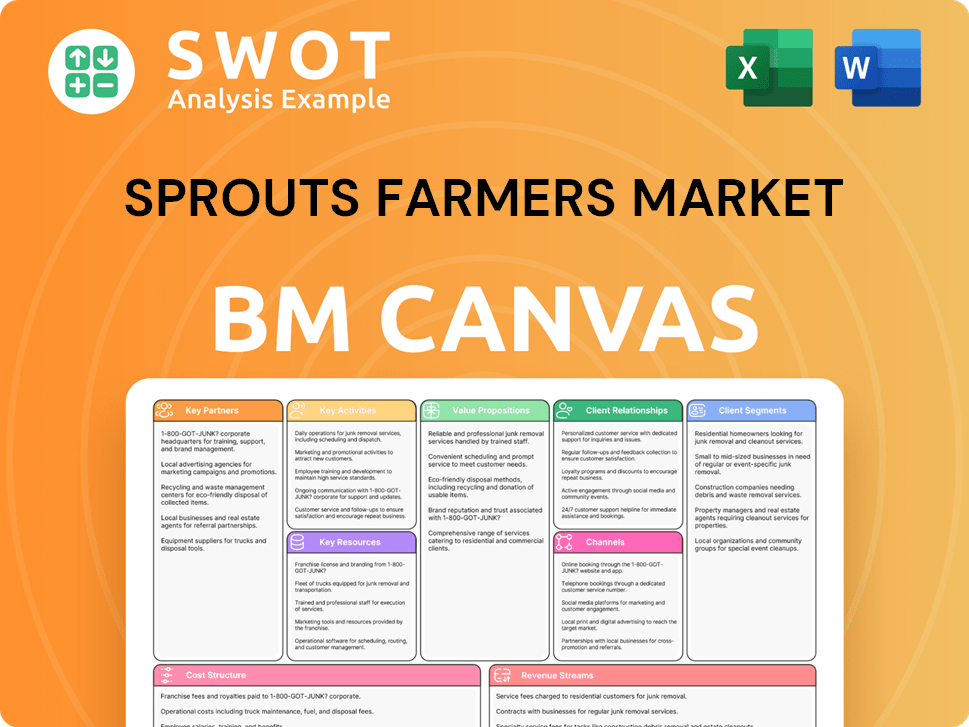
How Is Sprouts Farmers Market Positioning Itself for Continued Success?
Sprouts Farmers Market maintains a distinctive position within the competitive grocery store industry, particularly in the natural and organic food segment. The company differentiates itself through a value-oriented approach to healthy eating, competing with both conventional grocers and specialty retailers. With net sales reaching approximately $6.8 billion in fiscal year 2023, Sprouts demonstrates a solid industry presence and customer loyalty within its niche, indicating the company's ability to make money.
Key risks include intense competition, potential economic downturns affecting consumer spending on premium food items, and supply chain vulnerabilities. The evolving retail landscape, with increased online penetration, also presents both opportunities and risks. Strategic initiatives involve continued new store expansion, focusing on smaller formats, and enhancing private label offerings to improve margins and customer loyalty. The company is investing in technology to optimize its supply chain and improve the customer experience. For more insights, consider reading about the Target Market of Sprouts Farmers Market.
Sprouts Farmers Market holds a unique position in the grocery store sector, particularly within the natural and organic food segment. The company's focus on value differentiates it from competitors. The grocery store chain has demonstrated consistent sales growth, indicating a strong industry presence.
Key risks include intense competition and economic downturns impacting consumer spending. Supply chain vulnerabilities and regulatory changes also pose challenges. The evolving retail landscape presents both opportunities and risks for the Sprouts company.
Sprouts plans to sustain growth through disciplined strategies, optimizing its product mix, and enhancing operational efficiency. The company is committed to meeting the increasing consumer demand for healthy, affordable food. Strategic initiatives include new store expansion and technology investments.
Sprouts is focused on new store expansion, particularly in smaller formats, and enhancing its private label offerings. The company is also investing in technology to improve its supply chain and customer experience. These initiatives are aimed at improving margins and customer loyalty.
Sprouts Farmers Market is focusing on several key areas to drive future growth and maintain its competitive edge in the grocery store market. These include expanding its store footprint, enhancing its private label offerings, and investing in technology to improve operational efficiency. These strategies are designed to meet consumer demand for healthy, affordable food.
- Store Expansion: The company plans to open new Sprouts store locations, focusing on smaller, more efficient formats.
- Private Label: Increasing the range and appeal of its private label products to improve margins and customer loyalty.
- Technology Investments: Utilizing technology to optimize the supply chain and enhance the customer experience, including online ordering.
- Operational Efficiency: Improving overall efficiency to maintain its value proposition in the natural and organic food market.
Sprouts Farmers Market Porter's Five Forces Analysis
- Covers All 5 Competitive Forces in Detail
- Structured for Consultants, Students, and Founders
- 100% Editable in Microsoft Word & Excel
- Instant Digital Download – Use Immediately
- Compatible with Mac & PC – Fully Unlocked
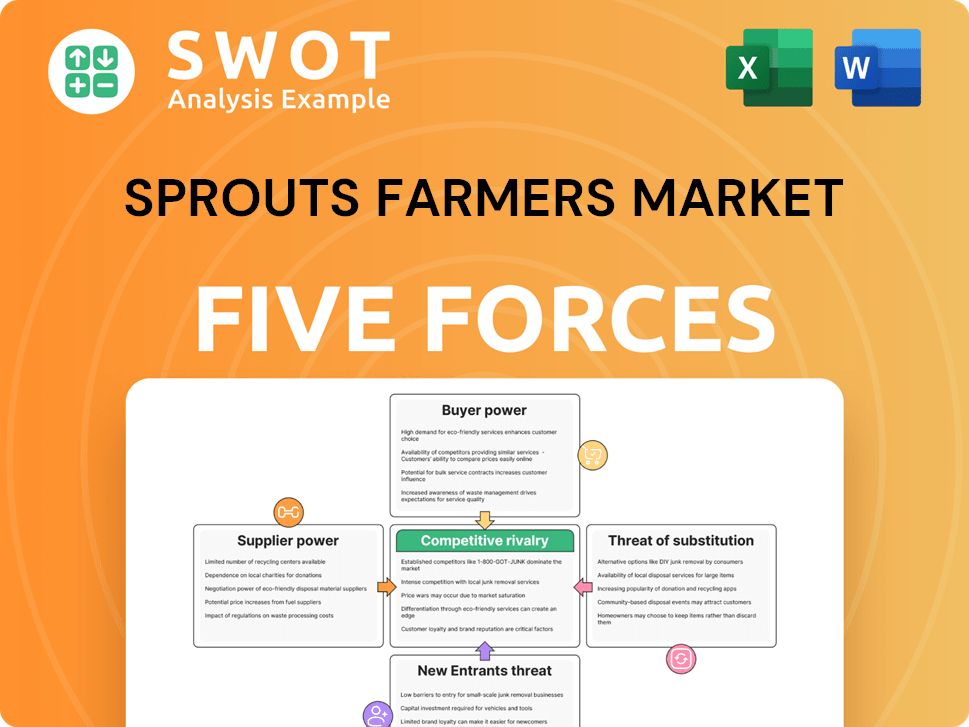
Related Blogs
- What are Mission Vision & Core Values of Sprouts Farmers Market Company?
- What is Competitive Landscape of Sprouts Farmers Market Company?
- What is Growth Strategy and Future Prospects of Sprouts Farmers Market Company?
- What is Sales and Marketing Strategy of Sprouts Farmers Market Company?
- What is Brief History of Sprouts Farmers Market Company?
- Who Owns Sprouts Farmers Market Company?
- What is Customer Demographics and Target Market of Sprouts Farmers Market Company?
Disclaimer
All information, articles, and product details provided on this website are for general informational and educational purposes only. We do not claim any ownership over, nor do we intend to infringe upon, any trademarks, copyrights, logos, brand names, or other intellectual property mentioned or depicted on this site. Such intellectual property remains the property of its respective owners, and any references here are made solely for identification or informational purposes, without implying any affiliation, endorsement, or partnership.
We make no representations or warranties, express or implied, regarding the accuracy, completeness, or suitability of any content or products presented. Nothing on this website should be construed as legal, tax, investment, financial, medical, or other professional advice. In addition, no part of this site—including articles or product references—constitutes a solicitation, recommendation, endorsement, advertisement, or offer to buy or sell any securities, franchises, or other financial instruments, particularly in jurisdictions where such activity would be unlawful.
All content is of a general nature and may not address the specific circumstances of any individual or entity. It is not a substitute for professional advice or services. Any actions you take based on the information provided here are strictly at your own risk. You accept full responsibility for any decisions or outcomes arising from your use of this website and agree to release us from any liability in connection with your use of, or reliance upon, the content or products found herein.